PACS news / February 25, 2021
Stanford PACS 2020: A Special Progress Report
2020 was a growth year for Stanford PACS as we welcomed a new Executive Director and shifted research and programming to address the compound challenges of the pandemic, social unrest and threats to the safety and integrity of the U.S. presidential elections.

As a research center with a mission to develop and share knowledge to improve philanthropy, strengthen civil society, and address societal challenges, the Stanford Center on Philanthropy and Civil Society (Stanford PACS) continued to expand the breadth and depth of our scholarly research in 2020, despite, and in many instances in response to, the COVID-19 pandemic. In addition to an ambitious schedule of publications and virtual convenings, Stanford PACS scholars produced rigorously researched ideas and solutions to inform policymakers. We also stood firm in our commitment to build the pipeline of scholars who will study topics related to philanthropy and civil society through generous Ph.D. fellowships and small grants for Stanford students, and postdoctoral and practitioner fellowships to attract emerging scholars and leaders from around the world.
After 11 years as inaugural Executive Director at Stanford PACS, Kim Meredith accepted a new position as CEO of San Francisco General Hospital Foundation in May 2020. Kim maintained her commitment to Stanford PACS by joining its advisory board. In October 2020, Stanford PACS welcomed Carla Eckhardt as its new Executive Director. With more than 25 years of leadership experience in nonprofit, academic, and for-profit settings, Carla brings deep expertise and commitment to her role in guiding the Stanford PACS and SSIR community in its cross-sector work to strengthen philanthropy and civil society worldwide. Read more about Carla here.

The unwavering support of our donors and advisory board members was crucial in allowing our scholars to respond to the pandemic and looming uncertainty around the 2020 presidential elections.
Expanding research and informing policy
2020 was a momentous year in many ways. Even as the COVID-19 pandemic upended daily life, citizens in the United States participated in civil rights protests and turned out in record numbers to vote in a historic presidential election. The Program on Democracy and the Internet (PDI) at Stanford PACS launched the Stanford-MIT Healthy Elections Project (HEP), under the leadership of Professor Nathaniel Persily (PDI Co-director and Stanford Law Professor) and Charles Stewart III (Kenan Sahin Distinguished Professor of Political Science at MIT) to help ensure that the 2020 U.S. Presidential Elections proceeded with safety, integrity and equal access for all. The project received special mentions in TIME Magazine, NBC News, and the BBC for its COVID-related litigation tracker and its training resources were used by many, including the Michigan Department of State, to prepare poll workers for Election Day.
Through a partnership with the Stanford Internet Observatory, PDI scholars also developed The Election Disinformation Project, an independent platform that investigated coordinated online disinformation threats related to the voting process. PDI also convened a working group to consider the various ways today’s digital platforms pose threats to American democracy and creative technological interventions that might mitigate the platforms’ growing power. The group included a diverse and interdisciplinary group of scholars whose findings were summarized in a white paper titled “Report of the Working Group on Platform Scale”. The paper concluded that a combination of regulation and new technology might enable new forms of competition to emerge on top of the existing platforms, an approach they called a ‘middleware’ solution, that could take editorial power away from a small number of technology platforms and hand it not to a single government regulator, but to a diverse group of competitive firms that could allow users to tailor their online experiences.
In 2020, disinformation and misinformation also became a serious impediment in ensuring adherence to public health guidelines about COVID-19. In response to this, the Polarization and Social Change Lab co-led an interdisciplinary review summing up the most relevant research from psychology, sociology, public health, and other social sciences, to aid the response to the pandemic and help change behavior to adjust to life during the crisis. The review gathered over 40 researchers at more than 20 colleges and universities, recruited by Professor Robb Willer, Director of the Polarization and Social Change Lab at Stanford University, and his colleague Jay Van Bavel, an associate professor in New York University’s Department of Psychology. The result was a paper titled, “Using social and behavioral science to support COVID-19 pandemic response,” published in the journal Nature Human Behaviour in April 2020, cited over 1,100 times and viewed over 250,000 times since. The Lab continued its work in this space with ongoing projects evaluating the effectiveness of public service announcements to increase compliance with COVID-19 public health guidelines.
For all the challenges the pandemic posed in the past year, it also bore testament to the spirit and resilience of our people, especially as we observe how the nonprofit sector and civil society organizations adapted and responded to the current moment. Researchers from the Civic Life of Cities Lab at Stanford PACS published an article in the Boston Review on how nonprofits have proven to be critical links in the nation’s public health infrastructure. Even those with mandates unrelated to health and poverty relief are turning out to be integral to their communities’ survival.
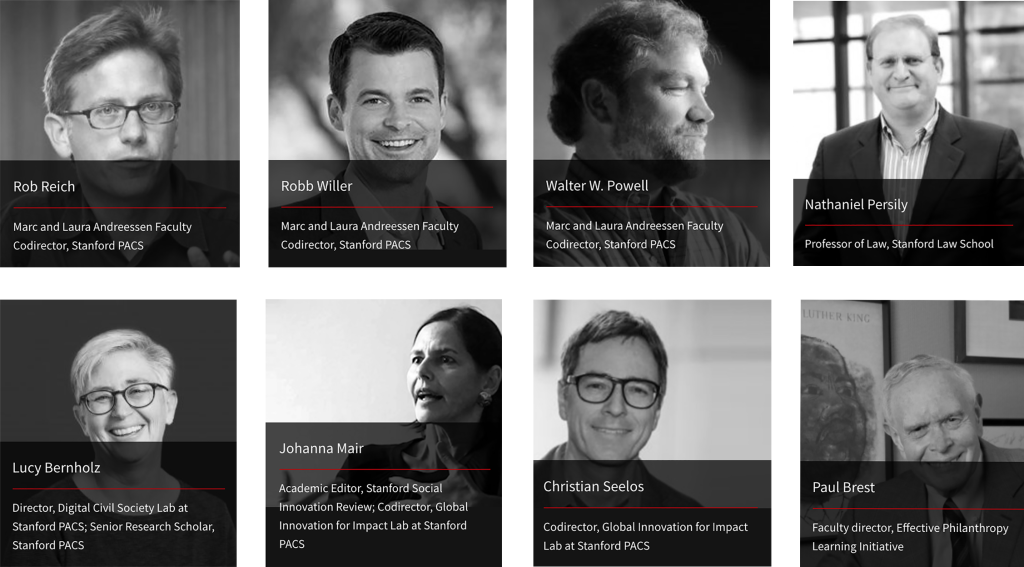
At the heart of all Stanford PACS activity is its excellent research led by world-class faculty and scholars.
Supporting scholars and social sector leaders
Stanford PACS fellows spend the academic year participating in a year-long research workshop, engaging in discussions with featured faculty, and contributing to other parts of academic life at the Center. Fellows gain new knowledge across various topics and enrich PACS’s academic community by bringing new ideas and fresh perspectives to our research and practice.
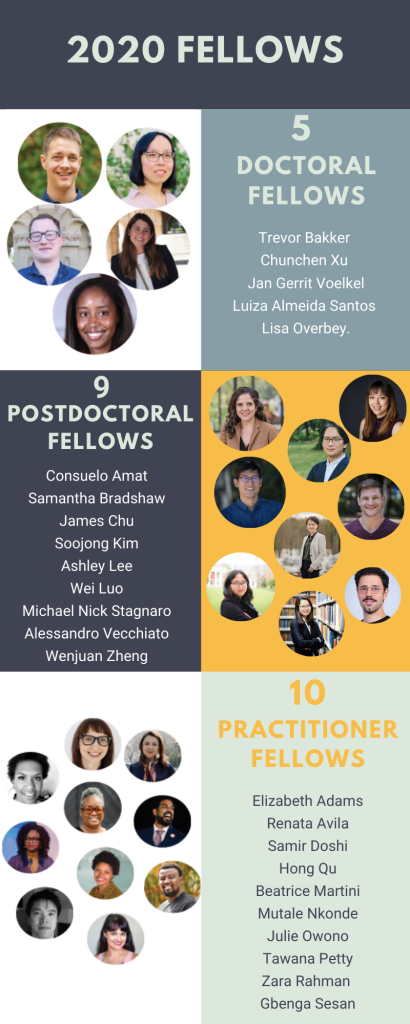
Our Ph.D. and Postdoctoral fellows spend their time with Stanford PACS participating in a year-long research seminar, engaging in discussions with featured faculty, and contributing to other parts of academic life at the Center. They gain new knowledge across various topics and enrich PACS’ academic community with new ideas and fresh perspectives.
We offered $17,560 in small grants to encourage student research in related areas in 2020. These grants typically fund undergraduate honors theses, masters’ students’ capstone projects, and doctoral student research.
Strengthening civil society & the nonprofit sector
The Digital Civil Society Lab, led by Lucy Bernholz and Rob Reich, launched the Digital Assembly Research Network (DARN, #DigitalAssembly), an email community to catalyze research and discussion on freedom of assembly in a digital world. So far, more than 415 scholars, advocates, funders, civil society leaders, and lawyers have joined the network; they have held four highly engaging virtual meetings and are preparing for a year in which the digital trails that follow us into physical gatherings are of increasing concern.
The DCSL team also held Reclaiming Digital Infrastructure for the Public Interest, a 3-part learning series to build awareness, intention, and engagement in designing a digital infrastructure that aligns with community aspirations, protects personal and group safety, and prioritizes people, communities, and the public good. The event was attended on Zoom by 800 people and inspired a new proposal to the National Science Foundation to draft public policies.
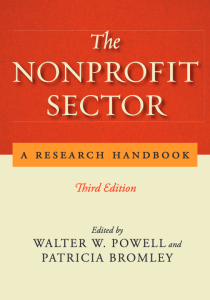
In 2020, Stanford PACS also published The Nonprofit Sector: A Research Handbook, edited by Woody Powell and Patricia Bromley, which brought together leading researchers – economists, historians, philosophers, political scientists, sociologists, and more – to investigate the impact of associational life. From the history of the nonprofit sector and of philanthropy to the politics of the public sphere, The Nonprofit Sector fills a unique space in the nonprofit literature as the only sector-wide volume aimed at furthering research in the field.
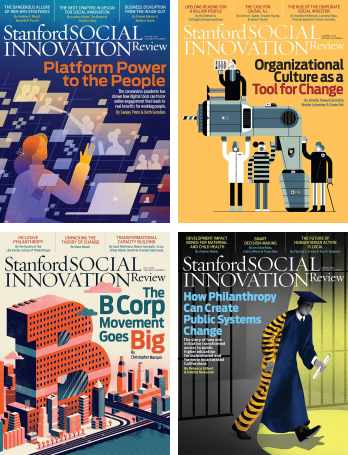
In 2020, Stanford Social Innovation Review – Stanford PACS’ award-winning multimedia property dedicated to cross-sector solutions to global problems – continued its mission to inform and educate over 3.0 million people worldwide through its quarterly print magazine, website, conferences, webinars, and other channels. In March, when the wider impact of the COVID-19 pandemic began to affect much of the world, SSIR launched an online series titled “Rethinking Social Change in the Face of the Coronavirus,” and continues to publish timely pandemic-related articles. The goal of the series is to present insights from social change leaders around the world to help organizations better face the systemic, operational, and strategic challenges of the global health crisis that have tested the limits of their capabilities. The 2020 Nonprofit Management Institute also focused on innovative social-sector responses to the COVID-19 crisis, featuring conversations on organizational resiliency, capitalism and democracy, racial and ethnic justice, personal well-being, and many other topics that have renewed urgency at this time. SSIR also signed agreements to begin publishing Arabic-, Spanish-, and Japanese-language editions, bringing SSIR to six local-language publishing partnerships (including Chinese, Korean, and Turkish), with additional discussions started to publish in Portuguese underway.
In May and June, SSIR also produced an invitation-only 2-part virtual event series in partnership with the Ford Foundation called “Realizing Democracy.” The convening brought together philanthropic leaders from an array of foundations to examine the role that philanthropy can and should play in supporting democratic participation and equity. The series was tied to a supplement in SSIR that Ford sponsored earlier.
In October 2020 the Global Innovation for Impact Lab , led by Johanna Mair and Christian Seelos, assembled senior representatives from leading U.S. and European foundations, think tanks, and development organizations for an intimate workshop about the hurdles and opportunities for adopting system change perspectives. The workshop named “A Frank Conversation About Systems” was intended to kickstart a community of practice that develops useful frameworks and instruments that inform practical work as well as to positively influence the sector to rethink stifling attitudes, practices, and principles.
Our annual conference on social innovation in China converted to a virtual event in November. In collaboration with Leping Foundation, we hosted the Stanford PACS China Social Innovation Summit 2020: New Connectivity Creating New Momentum to support and build the social impact sector in the country. Simulcast in both English and Mandarin over two separate technology platforms, this conference showcased leaders in philanthropy, business, academia and nonprofit and attracted over 2,100 in attendance.
Improving the practice of philanthropy
As communities and civil society organizations struggled due to the pandemic, philanthropy acted as a critical lifeline for many charities. The crisis only amplified the need for the Effective Philanthropy Learning Initiative (EPLI), led by Paul Brest and Erinn Andrews, to continue with its timely research tracking donor trends, resources to drive donors to action, and educational programs to train and teach donors and intermediaries on how to most effectively help.
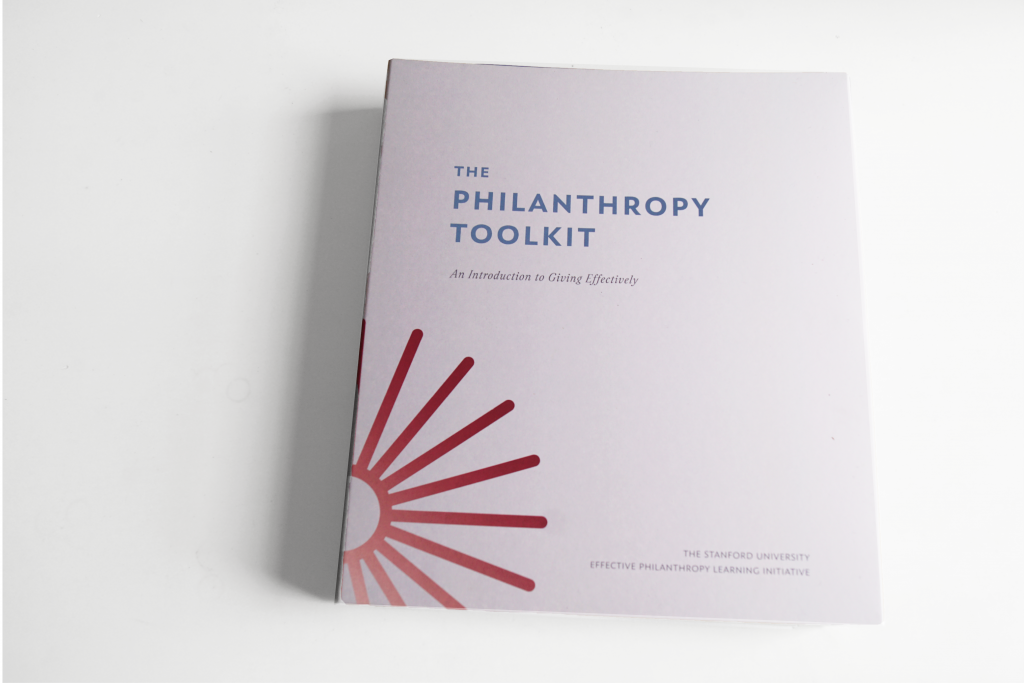
During this time, the Effective Philanthropy Learning Initiative published two new resources to guide emerging, high-capacity philanthropists on their giving journey – the Stanford PACS Guide to Effective Philanthropy and the Stanford PACS Philanthropy Toolkit, both available in print (through a new e-storefront) and online (on EPLI’s revamped webpage). EPLI also launched the Education for Philanthropy Professionals program, a virtual, executive-style learning course delivered through six half-day sessions over three weeks for philanthropic professionals in a leading role within a family foundation or family office who are in a unique position to guide philanthropists and execute on their vision for changing the world.

As part of Stanford PACS’ work with philanthropists, we organized a new signature convening in 2020. The First Principles Forum is a learning community for founders, senior leaders, and investors at some of the largest and most influential tech companies (such as Lyft, Uber, Twilio, Slack, Airbnb, Stripe, Pinterest, Postmates, and Google) to build their skills and knowledge around strategic and impactful giving. Through carefully curated small group discussions, the community grappled with the most pressing issues of our time such as racial inequity, pandemic response, worker protection, misinformation and climate change, learning from philanthropic, government, and academic experts.
As we continued to focus on making giving by high-capacity donors more effective, Senior Research Scholar and co-Director of our Digital Civil Society Lab, Lucy Bernholz published a 5-part series in the Chronicle of Philanthropy to explore what comes next for foundations and nonprofits in the aftermath of the pandemic as philanthropists and nonprofits grapple with the deep inequities that have always existed within our own practice. Rob Reich questioned the role of philanthropy during crisis, through articles such as The Dangers of Relying on Philanthropists During Pandemics.

In 2020, Stanford PACS held over 50 events, our scholars produced more than 60 publications and articles, and we hosted six major conferences. We invite you to learn more about our events, articles, and podcasts below.
